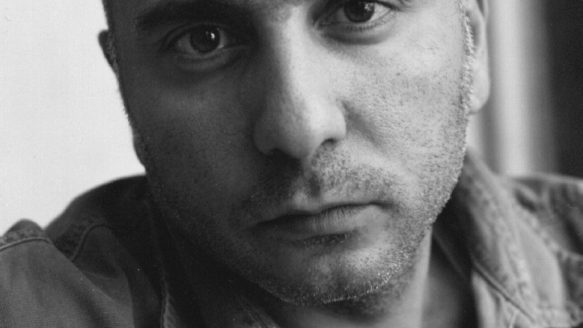Rawi Hage’s Carnival: Review by Laura Eggertson

Rawi Hage’s Carnival, Anansi, 289 pages, $29.95
Rawi Hage is, quite simply, a brilliant writer. Carnival, his third novel, just nominated for the short list for the Writers’ Trust fiction prize, was my first exposure to his elegiac prose, but it won’t be my last.
Set in an unnamed city that hosts its own carnival each year, the book is the story of Fly, a taxi driver raised in a travelling circus who now drives the gritty streets of his adopted home at night. Doubtless benefitting from Hage’s own encounters with passengers he carried during the years he drove a cab in Montreal, the story contains real and believable characters. Fly’s passengers form a collection of the desperate, the delinquent and the despicable.
There is Mary, whom Fly rescues from an unhappy marriage and protects, oblivious at first to her unstable mental health; Tammer, the squeegee boy Fly’s friends once loved; and the Dealer, who engages Fly for increasingly perilous work.
Hage’s genius lies in sketching visual pictures, using words and phrases to take his readers inside Fly’s imagination. It is no surprise that Hage is also a gifted photographer and visual artist, because his sentences are like perfectly composed photographs. He begins the novel with one of the all-time great opening lines in Canadian literature: “I was conceived on the circus trail by a traveller who owned a camel and a mother who swung from the ropes.”
Photos View gallery
 zoom
zoom
 zoom
zoom
Thus begins the oft-repeated narrative Fly tells himself. It shapes his sense of who he is and of his destiny, to spend his life “wandering among spiders and beasts.” Other drivers are the spiders, lurking in the shadows to catch passengers in their webs. He is a fly, who wanders the city, navigating its unexplored passageways in search of “the wavers and the whistlers” who roam in the margins.
Carnival is divided into five acts, with the first three focusing mainly on Fly’s recounting of his early life, his passengers’ stories and those of his fellow drivers, who gather at Café Bolero. In these first sections Hage skillfully depicts Fly’s vivid, often sexual fantasies, using rolling, rhythmic phrases to take us with Fly as he loses himself in ancient Levant and the land of the Canaanites, becomes a Turkish soldier before the Battle of Gallipoli, or prepares to join the Red Brigades in Italy.
In the last two acts, Hage focuses the novel more sharply and linearly on events connected to Fly’s friend Otto and Otto’s former foster son Tammer. Hage’s prose changes, as a result, and he adopts shorter, more direct sentences as he drives the story through violence towards its tragic conclusion.
Carnival is a book that bears re-reading. From the beginning, Hage provides clues that Fly may not be a reliable narrator. The doctor who visits Fly’s neighbour recommends psychiatric help based on Fly’s jerking hands, shifting eyes, long monologues and wild thoughts. Like his father’s flying carpet, Fly is not completely tethered to the earth, as his philosophical musings and metaphors reflect. He is one with the denizens of the night with whom he has chosen to spend his life.
This novel is at times funny, as when Fly uses his conjurers’ tricks to fool the psychic that driver Number 43 has recommended he consult to lift a passenger’s curse. It is also angry, perceptive and poignant, reflecting immigrants’ experiences of racism and the loneliness of the outcast and the unwell.
Carnival confirms Hage’s status as a star in the literary firmament. His first book, DeNiro’s Game, won the International IMPAC Dublin Literary Award, the Prix des libraires, and was a finalist for half a dozen other Canadian and international literary prizes. His second, Cockroach, was shortlisted for the Giller prize and other literary luminaries.
But don’t read Carnival because you should. Read it because it’s good.
Laura Eggertson is an Ottawa-based writer and editor who has never enjoyed reading Can Lit just because it was her patriotic duty.




